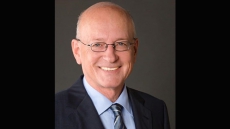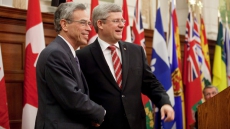TORONTO — Members of Canada's public health community are expressing concern about intended changes to the authority of the country's chief public health officer, changes that strip the office holder of the responsibility of running the Public Health Agency of Canada.
Several suggest the move to demote the position from its current status as deputy minister to that of an officer or employee of the agency will weaken the office, which was created in the aftermath of Canada's disastrous SARS experience in 2003.
The changes, included in the current omnibus finance bill making its way through Parliament, give authority for running the agency to a president, a newly created position. Prime Minister Stephen Harper has already named the new president: Krista Outhwaite, a career bureaucrat who has been the agency's chief operating officer.
The legislative change will allow the government to place a bureaucrat at the head of the agency. Under the current legislation the agency is run by the chief public health officer, who must by law be a medical professional.
Dr. Gregory Taylor, who was named chief public health officer in September, gave his endorsement for the change in his responsibilities when he testified last week to a Senate committee studying the bill.
"The changes make good management sense," said Taylor, who served as acting head of the agency for months before being appointed to the top job.
In fact, Health Minister Rona Ambrose suggested the idea for the new division of labour came from the agency itself.
"He now will be able to focus primarily and his successors as well will be able to focus primarily on communicating and engaging on public health issues," Ambrose said of Taylor. "I think it's a good idea and it makes a lot of common sense."
Taylor said when Canada's first chief public health officer, Dr. David Butler-Jones, went on a medical leave in May of 2012 after suffering a stroke, he and Outhwaite essentially divvied up the responsibilities of the agency's top job.
"The more time we spent in that structure, the more it became apparent that it was the right change to make. This was a change I strongly support," Taylor told the Senate committee.
During the same session, however, the committee was strongly advised against approving the change.
Dr. Perry Kendall, British Columbia's chief medical officer of health, said when the position of chief public health officer was envisaged, the decision to make the office holder a deputy minister was deliberately made.
The idea of having the agency run by a bureaucrat, not the chief public health officer, was considered and rejected, Kendall said.
"There is a rank and rank matters," said Kendall, who will retire next March after 15 years as B.C.'s chief doctor.
"And I am a little concerned that the chief public health officer does not have a deputy minister status to make him or her the equivalent to the deputies around the table. It makes a difference."
The position of chief public health officer of Canada was created on the recommendation of a report on the handling of the SARS crisis commissioned by the federal government of the day.
"The Government of Canada should create the position of Chief Public Health Officer of Canada," said the report, written by a committee of experts headed by Dr. David Naylor, who was then dean of medicine at the University of Toronto.
"The Canadian Agency for Public Health should be headed by the Chief Public Health Officer of Canada who would report directly to the federal minister of health and serve as the leading national voice for public health."
The new proposed structure would shift responsibility for the budget of the agency to the president. As well, the president would be responsible for staffing the institution.
Concerned observers wondered how much authority this will give the chief public health officer to set the agency's public health agenda or direct its responses to infectious disease outbreaks.
Steven Hoffman, a global health law expert at the University of Ottawa, said the agency could have a bureaucrat as a manager without placing that person over the chief public health officer.
"It doesn't make sense. We had a good model that at least provided some measure of independence for the chief public health officer. And moving towards a model that's maybe more comfortable for the current political leadership and cabinet is not helpful for public health," Hoffman said.
Hoffman said the move is reflective of the current federal government's distrust of scientists. "There's been a pretty systematic effort by this government to silence science and ensure that scientists are not saying things that run against the government's political agenda."
Kendall said he has discussed the planned change with a number of colleagues in the public health community and all agree stripping the chief public health officer of the responsibility of running the agency will undermine the role and the agency.
"In our view it will significantly weaken the agency and the position and the influence of the chief public health officer and his or her independence," Kendall testified.
"The move seems retrograde to us and ignores the lessons of the past."






